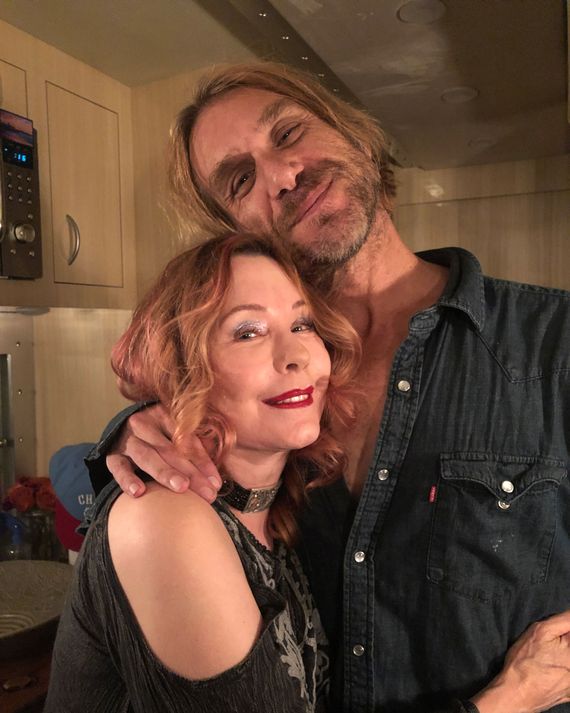
A young Kate Hudson is waiting in a dark parking lot outside a fictional Black Sabbath concert, sporting purple-tinted glasses, carrying a tackle-box-turned-bag, and wearing what must be one of the most memorable coats in cinematic history. She’s met by Patrick Fugit, playing a young journalist on assignment in Cameron Crowe’s semi-autobiographical paean to rock and roll, Almost Famous, who quickly insists he’s not a “groupie” like Hudson’s Penny Lane. “We. Are. Not. Groupies,” she coos in response, secreting effortless cool as the queen of the young female rock acolytes around her. “We’re here because of the music,” she explains. “We are Band-Aids. We don’t have intercourse with these guys. We support the music. We inspire the music. We’re here because of the music!”
“What a pussy line!” Pamela Des Barres yells at me, speaking from her bedroom in Reseda, Los Angeles, 20 years after Almost Famous first debuted in theaters. Des Barres is better known as the real Queen of the Groupies, the woman who actually hooked up with Mick Jagger and Jimmy Page (not to mention the Who’s Keith Moon; Jim Morrison; Jimi Hendrix’s bass player, Noel Redding; Waylon Jennings; and more). “And ‘pussy’ in a bad way. I hate that the word is used in a negative way, but anyway — [Penny Lane] was not owning herself, not owning groupiedom and what it actually means.”
This is just the beginning of the movie’s problems for Des Barres, the now 72-year-old, flaming red-haired author, former groupie, and musician, who is widely considered to be one of the primary inspirations for Kate Hudson’s character, alongside groupie Pennie Lane Trumbull and singer Bebe Buell, Liv Tyler’s mother.
It’s not that Des Barres dislikes Almost Famous. In fact, every time she bashes it during our conversation, she is careful to remind me that she doesn’t want to sound like “a bitter old jerk.” “I’m not saying it wasn’t a good movie,” she says, right before making an argument for why it’s not a good movie. In reality, all of her actual groupie girlfriends love Almost Famous, mostly for characterizing them as more than stupid young girls who’d throw themselves, lemming-like, off any stage for a man who asked them to do so. According to Des Barres and her girlfriends, “groupie” used to carry an intensely negative connotation — something to do with the “uptight sexual nature of America” — but Crowe’s movie pushed back on that. “It was a positive look at the groupie-muse,” Des Barres says. “And I’ve been trying to redeem the word ‘groupie’ for most of my life.”
For Des Barres, all her troubles with Crowe’s story began at its premiere in 2000, which she says the director invited her to attend. “I was actually dumbstruck,” she says of seeing the movie for the first time. “Because that character was basically more me than Bebe Buell or Pennie Trumbull. She looked way more like me.” Her suspicions were confirmed when she ran into Kate Hudson at the afterparty, and Hudson told Des Barres that she read her book, I’m With the Band, for research, and even hung photos of Des Barres around her dressing room.
Truthfully, Des Barres found herself upset that she, the actual Groupie Goddess, hadn’t been invited to tell her own story. “It made it impossible for me to sell my film,” she says, noting that she’d written her own script for a project that she still “can’t talk about” to this day. She was frustrated that someone else had created the lasting cultural image of the groupie — at one point, she even describes the character of Penny Lane as “stolen” and “ripped off” from her.
“I confronted [Crowe] after this film came out, and he basically dismissed me,” says Des Barres. “But then I saw him a few years ago, and he sort of apologized. He actually said, ‘What can I do to make it up to you?’ I said ‘I should have been a consultant.’” (Appropriately, this all took place at a Duran Duran concert.)
Disappointment aside, Des Barres doesn’t linger in the negative, recalling how she first met Crowe when he was 15 years old in a doting, grandmotherly way. “I was hanging out with Zeppelin. I was always hanging out with them, even after Jimmy and I broke up,” she recalls. “Cameron was around. He was writing his first piece on them. He saw me in action. I was very, very close with Robert Plant. And I was invited to everything.”
This is another tendency of Des Barres’s. She likes to remind you of all of the people she knew and slept with. She runs off on beautiful, captivating, voyeuristic tangents — much like her books — to tell you about seeing Elvis from the front row (between Plant and Page by the way), or about her 50-year friendship with Alice Cooper, or the time she was dating Keith Moon and Waylon Jennings at the same time, but ended up hitting it off with her eventual husband, actor and singer Michael Des Barres. Part of her appeal is the bedrock of Crowe’s film. Des Barres really was almost famous. And we all want to be close to fame.
Talk of all these exploits brings up another key difference between Crowe’s depiction of groupies and the life Des Barres lived. To her, Almost Famous is “tepid” and “whitewashed” — a Disneyfied version of what she was doing back in the day. Recalling the infamous scene where the cast sings Elton John’s “Tiny Dancer” in a moment of much-needed onscreen unity, she growls, “That would never happen.”
What would have happened if she were on the bus? “Well, I was a groupie before there were bus trips. I was on jets,” she says. “But that was too cutesy and too clean for what really would have happened in that bus had I been on it.”
On the one hand, Des Barres understands Crowe’s sterile, PG-13 treatment of the early ’70s. The movie is, after all, an interpretation of the rock and roll world from the perspective of the director’s younger self, when he was 15 and watching “Miss Pamela” seduce Zeppelin. On the other hand, it’s also a naïve fantasy skewed by Crowe’s gender. This, at the end of the day, is Des Barres’s most significant qualm.
Near the close of Almost Famous, after Penny Lane has gone through a torrid affair with an up-and-coming guitar player, Russell Hammond (played by Billy Crudup), he breaks her heart, infamously trading her away in a poker game to Humble Pie for $50 and a case of Heineken. In response, Penny Lane runs off and nearly kills herself after taking too many quaaludes. So much for being a “Band-Aid” for the “music” and the “inspiration.” Rather, when rejected by a (shitty) man, the movie’s heroine nearly ends her life because she doesn’t see a path forward without his love.
That doesn’t sit well with Des Barres. She calls it a “horribly misogynistic look at what a groupie-muse is” and vents, “That made me so angry. This character, the groupie like she’s portrayed, is pathetic. I knew all the main groupies in the heyday of groupiedom. None of them would have done that. There was always someone else coming to town. That really turned me off. No actual music-loving goddess-groupie would do such a thing.”
Des Barres is no stranger to misogyny. After all, she’s a complicated figure, known by classic-rock lovers primarily for her penchant for sleeping with rock gods and documenting her experiences in deliciously horny tell-alls, rather than for her music (as a member of the GTOs) or her talent for writing. Looking back from the political moment of 2020, her work can spark nauseous feelings about a teen adored by older men. But Des Barres has always insisted it was never “that way.”
“I was always of age. I was always taken care of. I was always treated well,” she says of her sexual pursuits. “Everyone I was with was wonderful to me. [But] sometimes they were completely stoned out of their mind.”
At the time of her first book release, she says she was painted as submissive, subservient and anti-feminist by critics. She doesn’t see it that way, though: “I was a woman doing what I wanted to do, period. And that was feminism to me.” A few decades later, in a world that understands female sexuality a little differently, she is more likely to be received as a pioneer of feminine sexual agency instead — someone who wasn’t afraid to share her stories of men and sex and orgasms and famous cocks.
And yet, the most famous account of a ’70s groupie remains a fictional one, imagined through the eyes of a man. Undeterred, Des Barres continues to write about her life online, in addition to making podcasts and teaching women’s “mem-wahhh” over Zoom. She’s even started a Patreon and a Cameo, and is working on a book with someone, though she won’t say who.
By the end of our conversation, it’s still hard not to see Penny Lane in her. Or, more correctly — her in Penny Lane. They were both blessed with the power of magnetic attraction, able to woo and impress and entertain. Like rock and roll, and Almost Famous, and the lyrics of Zeppelin’s “The Rain Song,” they all promise you something special, a proximity to fame and stardom and divine rock knowledge unlike anything you can find anywhere else.
Asked if rock and roll can save the world, Miss Pamela replies, “It already has.”



